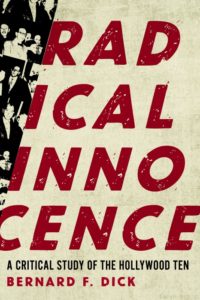Ever since I can remember I’ve always been fascinated about the history of Hollywood. From the Manson Family Tate/LaBianca murders to the conviction of The Hollywood Ten, to me, Hollywood history has always stood out as one of the most vivid kinds of history we have. Now, Bernard F. Dick has given us another fine taste of that history with his amazing new historical nonfiction book, Radical Innocence: A Critical Study of The Hollywood Ten.
Set in 1960s Hollywood, during the famous McCarthyism era, this novel tells the story of the Hollywood Ten, a group of Hollywood writers and directors that bravely spoke out against the House Un-American Activities Committee and their unsubstantiated claims about Hollywood being overrun by Communism. The Ten were called Communists, then were arrested, tried, and convicted for bogus contempt of Congress charges.
For me, the main thing that stands out about the book is the extensive research that was done while writing it. From notes about the McCarthy era to references about the history of the members of The Hollywood Ten, this is a vividly recorded book, and that aspect alone is what really shaped my enjoyment of it.
Dick also does a great job with the themes woven within the story of The Hollywood Ten. For example, one of the main themes of the time was the importance of filmmakers being able to voice their own opinions. The reason why The Hollywood Ten were the only ones that were convicted during McCarthyism was because the Ten were the ones who spoke up against the baseless accusations of communism that were flung at them, and at the Hollywood community as a whole. This theme is expertly handled by Dick and is woven beautifully into his accounting of the events during this time.
Now, while I understand the book is about The Hollywood Ten, there were so many other interesting things going on with McCarthyism in Hollywood at the time. For example, yes, The Hollywood Ten were the ones that were convicted but they were not the only ones who were hurt by this era. Many other famous Hollywood actors, producers, directors, and writers were blacklisted and lost their careers because of McCarthyism, and I would have liked to have read more about those people instead of just The Hollywood Ten. Even a chapter centred around McCarthy, the man who kicked off the entire era, would have been interesting to read.
That aside, Radical Innocence: A Critical Study of The Hollywood Ten is a great book that details the dramatic events that led up to the conviction of The Hollywood Ten and the ramifications it had on Hollywood.

